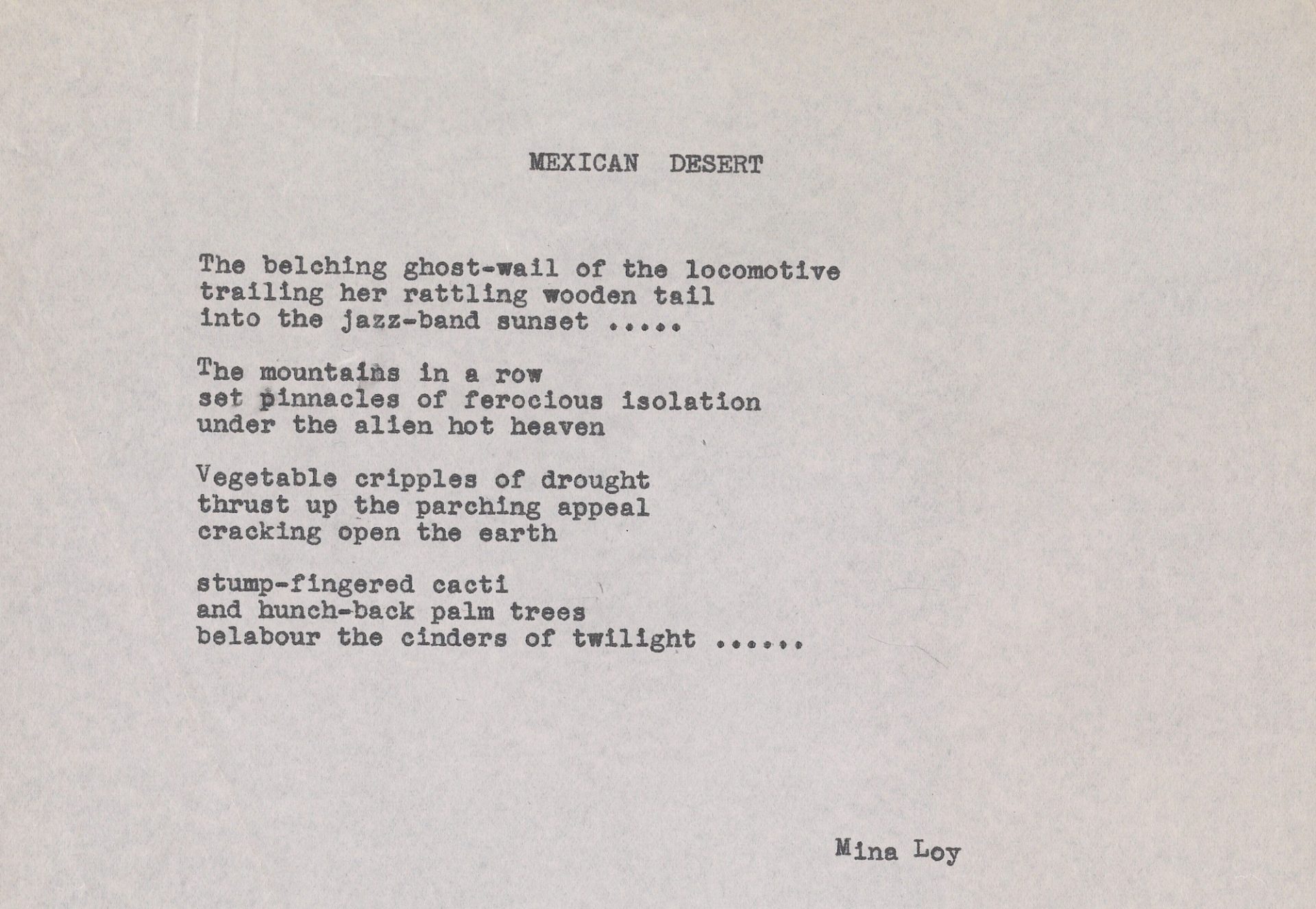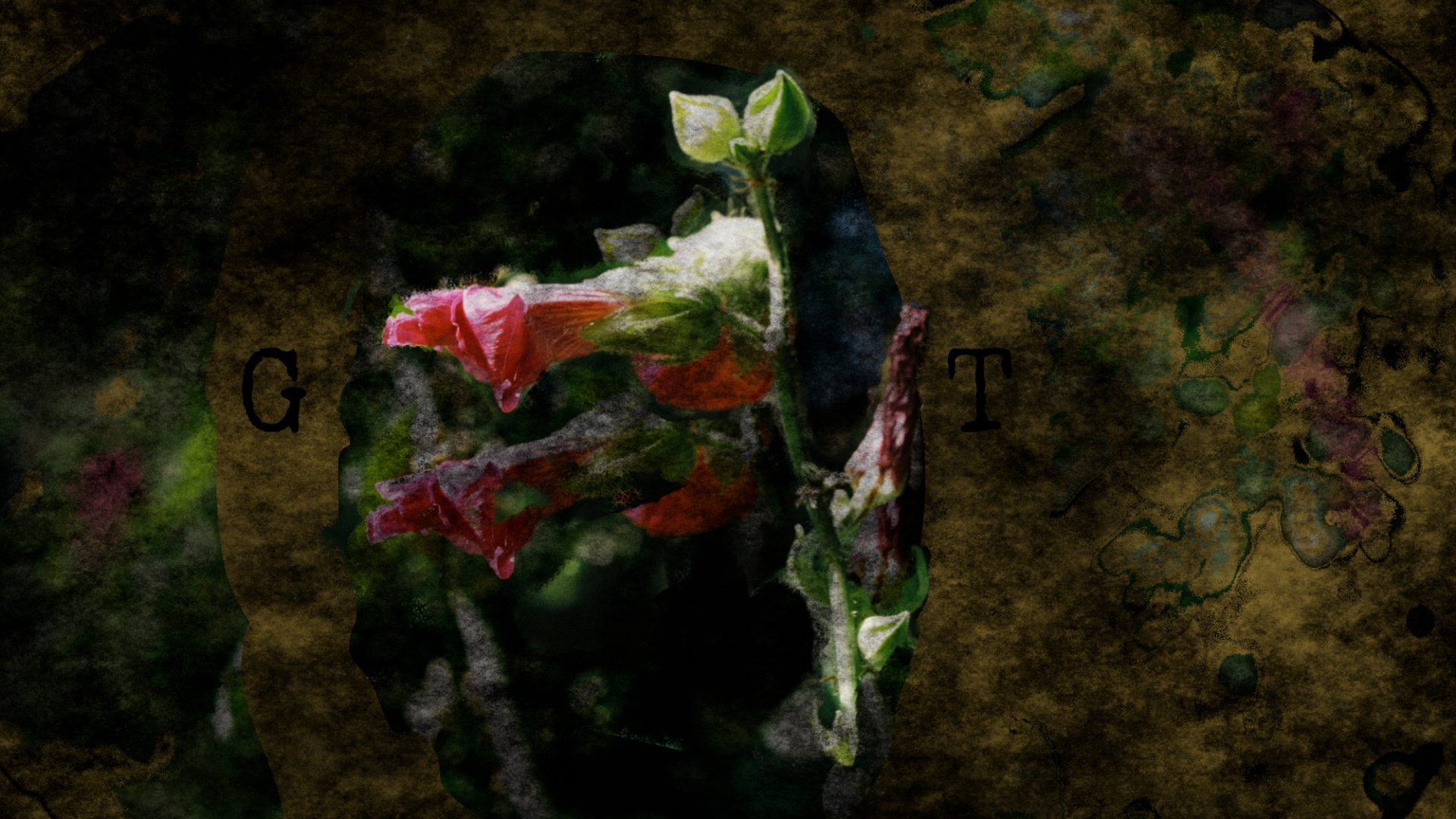La Muse endormie
* * *
In 1909 Brancusi created the first La muse endormie in marble, which is now at the Hirshorn Museum and Sculpture Garden in Washington, D.C. From this marble he cast a plaster mould, from which he then cast six bronzes.
Brancusi’s original muse was the Baroness Renée Frachon, who posed for Brancusi from 1908 to 1910. Following a number of preliminary studies modelled in clay, a first version carved in stone (now lost) was a ‘portrait’ standing upright, with a stylised oval face in which the geometric nose and mouth are slightly asymmetrical.
This bronze was taken from the original intermediate plaster, patinated with shellac and kept by the artist in his studio. The imperfections in the casting plaster can be seen in the bronze itself, partly patinated, polished and gilded with gold leaf, a practice Brancusi used from his first casts in polished bronze.
One of Brancusi’s mantras was, ‘Create like a god, command like a king, work like a slave’. Friends recalled the sculptor’s long, meditative sessions of polishing over the course of weeks and even months, as he worked to perfect his desired effects. ‘An artist should always do his own chores,’ he insisted. ‘A sculptor’s toil is slow and solitary.’
In La muse endormie, the form of a sleeping woman’s head has been distilled into an almost perfect oval, the purity of outline marked only by subtle, attenuated allusions to the physical features of the model.
* * *
… Mina Loy’s sojourn in New York was financially disappointing, but it did fulfill her long quest for a man as forceful as his rhetoric. This man was Arthur Cravan (born Fabian Avenarius Lloyd), forerunner of Dada and surrealism. A legend in his own time for his irreverent assaults on propriety, Cravan had earned passage to New York by taking a fall in a boxing match with his friend black heavyweight champion Jack Johnson in Barcelona, Spain (1916). Loy and Cravan met in New York and were married in Mexico City in January 1918. They led a hand-to-mouth existence in Mexico until November 1918 when, with Loy pregnant, they decided to return to Europe to pick up her children and settle in Paris. She sailed ahead to Buenos Aires, expecting Cravan to join her; but he disappeared, never to be heard of again. She returned to London for the birth of their daughter, Fabi (Jemima Fabienne), in April 1919. Cravan’s disappearance was, as Loy’s response to the Little Review“Questionnaire” of 1929 makes clear, the foremost tragedy of her life: “What has been the happiest moment of your life?”—”Every moment I spent with Arthur Cravan.” “The unhappiest?”—”The rest of the time.”
* * *
Akhmatova began writing verse at age 11 and at 21 joined a group of St. Petersburg poets, the Acmeists, whose leader, Nikolay Gumilyow, she married in 1910…
…Akhmatova’s principal motif is frustrated and tragic love expressed with an intensely feminine accent and inflection entirely her own……
The execution in 1921 of her former husband, Gumilyov, on trumped-up charges of participation in an anti-Soviet conspiracy further complicated her position. In 1923 she entered a period of almost complete poetic silence and literary ostracism, and no volume of her poetry appeared in the Soviet Union until 1940…
The 1930s were especially hard for Akhmatova. Her son, Lev Gumilyov (1912–92), and her third husband (she was married from 1918 to 1928 to the Assyriologist Vladimir Shileiko), art historian and critic Nikolay Punin (1888–1953), were arrested for political deviance in 1935. Both were soon released, but her son was arrested again in 1938 and subsequently served a five-year sentence in the Gulag. Her friend Mandelshtam was arrested in her presence in 1934 and died in a concentration camp in 1938. /Britannica/
Anna Akhmatova, Poetry Foundation
* * *
Anna Mina
1882/1889 – 1966
Mina Loy, original name Mina Lowy, (born Dec. 27, 1882, London, Eng.—died Sept. 25, 1966,Aspen, Colo., U.S.), modernist poet whose strongly feminist work portrayed unflinchingly the intimate aspects of female sexuality and emotional life.
Anna Akhmatova, pseudonym of Anna Andreyevna Gorenko, (born June 11 [June 23, New Style], 1889, Bolshoy Fontan, near Odessa, Ukraine, Russian Empire—died March 5, 1966, Domodedovo, near Moscow, Russia, U.S.S.R.) Russian poet recognized at her death as the greatest woman poet in Russian Literature /Britannica/
* * *
Arthur Nikolai
1886/1887 – 1918/1921
Arthur Cravan (born Fabian Avenarius Lloyd; 22 May 1887 – disappeared 1918) was a Swiss writer, poet, artist and boxer.
Nikolai Stepanovich Gumilev (also Gumilyov; Russian: Николай Степанович Гумилёв) April 15, 1886 – August 26, 1921) was a poet, literary critic, traveler, and military officer. He was a cofounder of the Acmeist movement. He was husband of Anna Akhmatova and father of Lev Gumilev. Nikolay Gumilev was arrested and executed by the Cheka, the secret Soviet police force, in 1921.
* * *
Lili Boulanger
Marie-Juliette Olga “Lili” Boulanger (21 August 1893 – 15 March 1918) was a French composer and the first female winner of the Prix de Rome composition prize. Her older sister was the noted composer and composition teacher Nadia Boulanger. Lili Boulanger was one of the most exciting composers of the early 20th century, until her tragically early death at the age of 24.
* * *
Песенки
1. Дорожная, или Голос из темноты
Кто чего боится,
То с тем и случится,–
Ничего бояться не надо.
Эта песня пета,
Пета, да не эта
А другая тоже
На нее похожа…
Боже!
— Анна Ахматова
English Translation here
* * *
El futuro
Y sé muy bien que no estarás.
No estarás en la calle, en el murmullo que brota de noche
de los postes de alumbrado, ni en el gesto
de elegir el menú, ni en la sonrisa
que alivia los completos en los subtes,
ni en los libros prestados ni en el hasta mañana.
No estarás en mis sueños,
en el destino original de mis palabras,
ni en una cifra telefónica estarás
o en el color de un par de guantes o una blusa.
Me enojaré, amor mío, sin que sea por ti,
y compraré bombones pero no para ti,
me pararé en la esquina a la que no vendrás,
y diré las palabras que se dicen
y comeré las cosas que se comen
y soñaré los sueños que se sueñan
y sé muy bien que no estarás,
ni aquí adentro, la cárcel donde aún te retengo,
ni allí fuera, este río de calles y de puentes.
No estarás para nada, no serás ni recuerdo,
y cuando piense en ti pensaré un pensamiento
que oscuramente trata de acordarse de ti.
— Julio Cortázar
THE FUTURE
And I know full well you won’t be there.
You won’t be in the street, in the hum that buzzes
from the arc lamps at night, nor in the gesture
of selecting from the menu, nor in the smile
that lightens people packed into the subway,
nor in the borrowed books, nor in the see-you-tomorrow.
You won’t be in my dreams,
in my words’ first destination,
nor will you be in a telephone number
or in the color of a pair of gloves or a blouse.
I’ll get angry, love, without it being on account of you,
and I’ll buy chocolates but not for you,
I’ll stop at the corner you’ll never come to,
and I’ll say the words that are said
and I’ll eat the things that are eaten
and I’ll dream the dreams that are dreamed
and I know full well you won’t be there,
nor here inside, in the prison where I still hold you,
nor there outside, in this river of streets and bridges.
You won’t be there at all, you won’t even be a memory,
and when I think of you I’ll be thinking a thought
that’s obscurely trying to recall you.
— Translated by Stephen Kessler
* * *
Psalm 129 (130)
De profundis clamavi ad te Domine
Out of the depths I have cried to thee, O Lord:
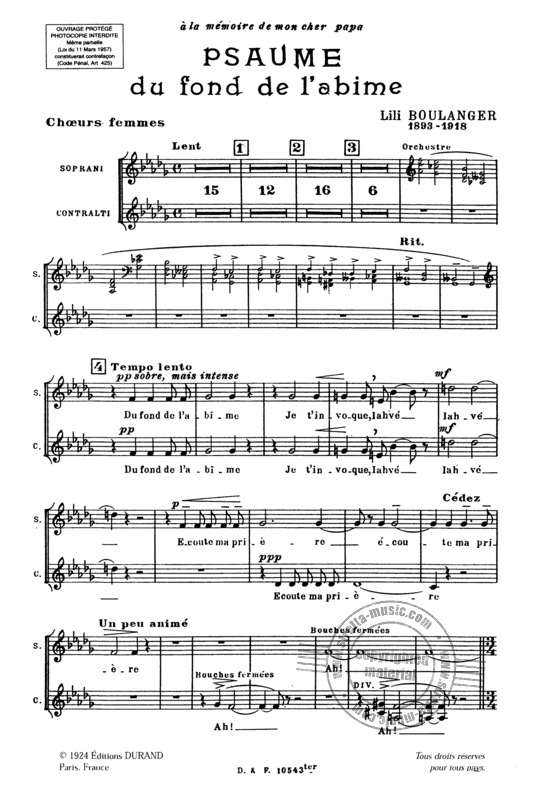
Psaume 130: Du fond de l’abîme
Language: French (Français) after the Latin
Psaume 130: Du fond de l ́abîme
Du fond de l’abîme je t’invoque Iahvé, Iahvé, Adonai: écoute ma prière!
Que tes oreilles soient attentives aux accents de ma prière, Iahvé, Iahvé, Adonai,
du fond de l’abîme je t’invoque Iahvé,
je crie vers toi, Iahvé, Adonai.
Ecoute ma voix, écoute ma prière, Iahvé,
Que tes oreilles soient attentives aux accents de ma prière! Iahvé! Adonai! Je t’invoque Adonai!
Du fond de l’abîme je cries vers toi, Adonai!
Ecoute ma prière!
Je crie vers toi, Iahvé!
Je crie vers toi, Adonai!
Que tes oreilles soient attentives aux accents de ma prière!
Si tu prends garde aux péchés, Adonai,
qui donc pourra tenir, Adonai, Iahvé.
Du fond de l’abîme je crie vers toi, Iahvé, Adonai! Si tu prends garde aux péchés, Adonai,
qui donc pourra tenir, Adonai, Iahvé.
Mais la clémence est en toi afin qu’on te révère.
Mon âme espère en Iahvé.
J’espère, je compte sur sa parole plus que les guetteurs de la nuit n’aspirent au matin.
Mon âme espère en Adonai plus que les guetteurs de la nuit n’aspirent au matin, Adonai.
La clémence est en Iahvè, afin qu’on te révère. Mon âme espère en Iahvé, j’espère en toi,
j’espère en Iahvé, j’espère en toi parole,
j’espère en ta clémence, je t’invoque Iahvé, Adonai: Ecoute ma priére!
Israel espère en Iahvé.
Car en Iahvé est la miséricorde et l’abondance de la délivrance. C’est lui qui délivrera Israel de toutes ces iniquités.
Israel espère en la clémence de Iahvé.
Du fond de l’abîme j’espère en toi.
Du fond de l’abîme je t’invoque, Iahvé, Adonai: Ecoute ma priére, Iahvé, Adonai!
Psalm 130. Other translations here
* * *
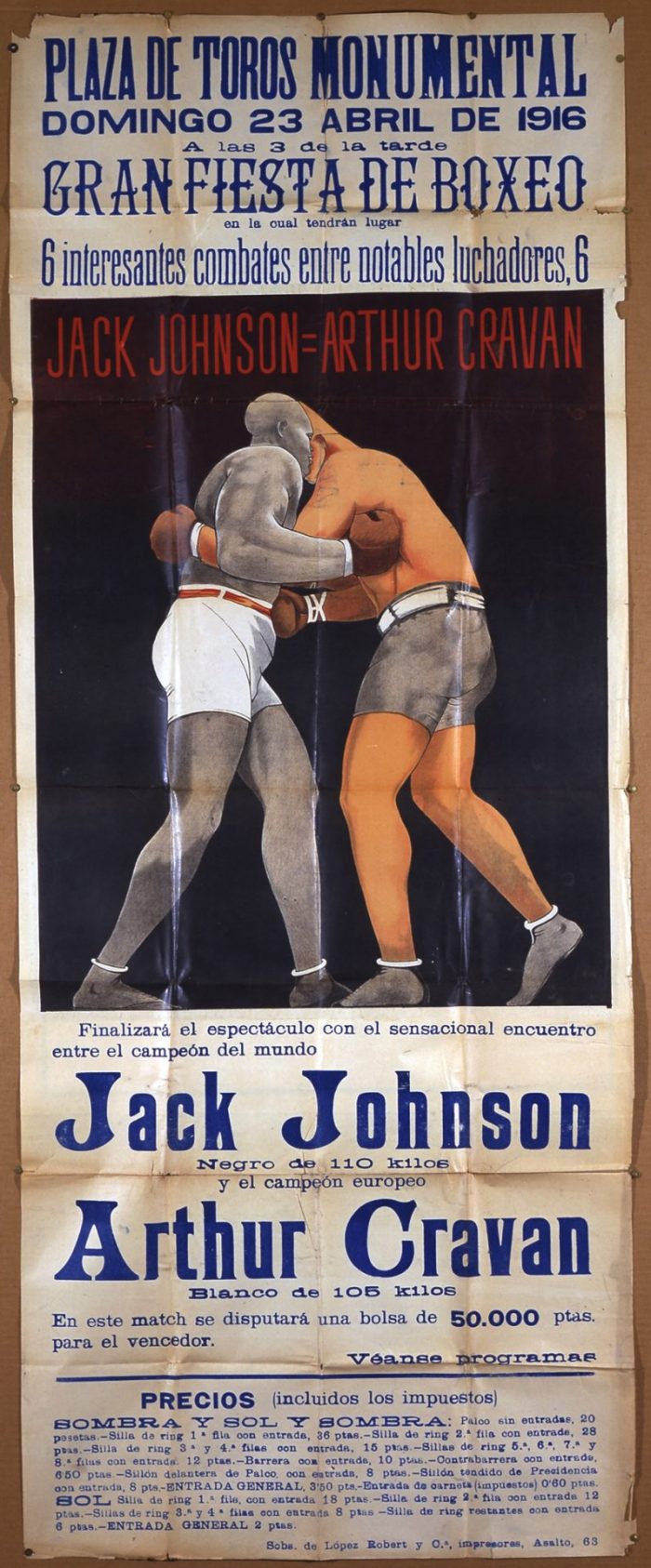
Adventurer as well as poet and boxer, ‘mystic Colossus’, towering figure, Fabian Avenarius Lloyd (1887-1918), assumed the pseudonym Arthur Cravan on arriving in Paris in 1909, he was a highly enigmatic man, a uniquely colourful character whose life merged into his work, and whose birth and death remain as obscure as his livelihood.
Cravan, nephew of Oscar Wilde, achieved fame through the non-conformist magazine Maintenant, of which he was director, editor and sole contributor. Not only as his mysterious background but also his behaviour and ‘sense of provocation’, Cravan is clearly entitled to a place among the key precursors of Dadaism.
* * *
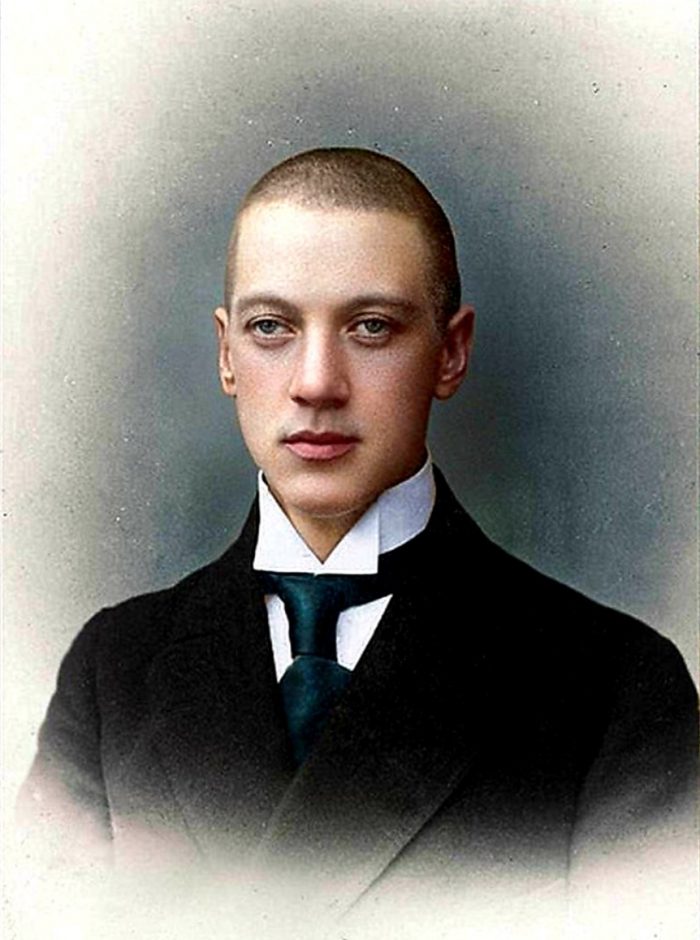
* * *
“There are poets from whom poetry remains, and only poetry. Their biography is just an appendix to the texts, a commentary on them, the history of their creation. This happens quite often – and it is with the greatest masters.
Everything is different with Gumilyov. From him remained not only poetry, but also the Legend – the image of a poet-warrior, poet-traveler, conquistador, conspirator. His entire conscious life – from his first African trip to his death in the dungeons of the Cheka (All-Russian Extraordinary Commission for Combating Counter-Revolution and Sabotage) – is building up into a spectacular and impressive picture. “I want not only my poetry, but also my life to be a work of art”, he said shortly before his death to Irina Odoevtseva. We can say that at least in part he did it. The biographical legend of Gumilyov captured the imagination of many young men in Russia in the 20th century, like the biography of Byron in the 19th century…” Valery Shubinsky
There are also scattered evidence of the execution of Gumilyov and his comrades in misfortune:
“The shooting was carried out at one of the stations of Irinovskaya railway station. The arrested were brought in at dawn and forced to dig a hole. When the pit was half ready, everyone was ordered to undress… Some of the doomed were forcibly pushed into the pit, and fire was opened at the pit. The rest of the bodies were herded onto a pile of bodies and killed in the same manner. After that, the pit, where the living and the wounded groaned, was covered with earth”.
The behavior of the Gumilyov in the last, terrible moments before firing pit told in 1921, the poet and part-time security officer for S.P. Bobrov:
“Yes… This is your Gumilyov… We, the Bolsheviks, this is ridiculous. But, you know, he died gorgeously. I heard first-hand. He smiled, finished his cigarette … Fanfare, of course. But even the guys from the special department were impressed. Empty youth, but still a tough guy. Few die like that. Well – dumped the fool. I would not go into the counter would go to us, I would have made a great career. We need such people”.
There is also evidence that poets close to Gumilyov found a gardener who lived near the place of execution, suggesting that he could see something, and persuaded him to tell about what happened. According to him, the whole party was placed in one row. Many men and women cried, fell to their knees, begged the drunken soldiers. Gumilyov stood motionless until the last minute”.
Among the many legends left after Gumilyov there is one. As if on the wall of the cell of the Kronstadt fortress, where Gumilyov spent the last night before the execution, scrawled verses were found.
At the hour of the evening, at the hour of the sunset
Like a winged caravel
Sails Petrograd…
And burns on a reddish disc
Your angel is on the obelisk
Like the sun, the little brother.
I am not worried, I am calm,
I am a poet, sailor and warrior
I will not give in to the executioner.
Let him brand with a shameful stigma –
I know, a black blood clot
I pay for the freedom.
But for the verse and for the courage,
For sonnets and for a sword –
I know – my proud city
At the hour of the evening, at the hour of the sunset
With the winged caravel
Will take me home”.
Experts disagree about the authorship of these lines, since no documentary evidence has yet been found. So let it just remain a beautiful farewell legend. /Novye Izvestia/
* * *
Mexican Desert
